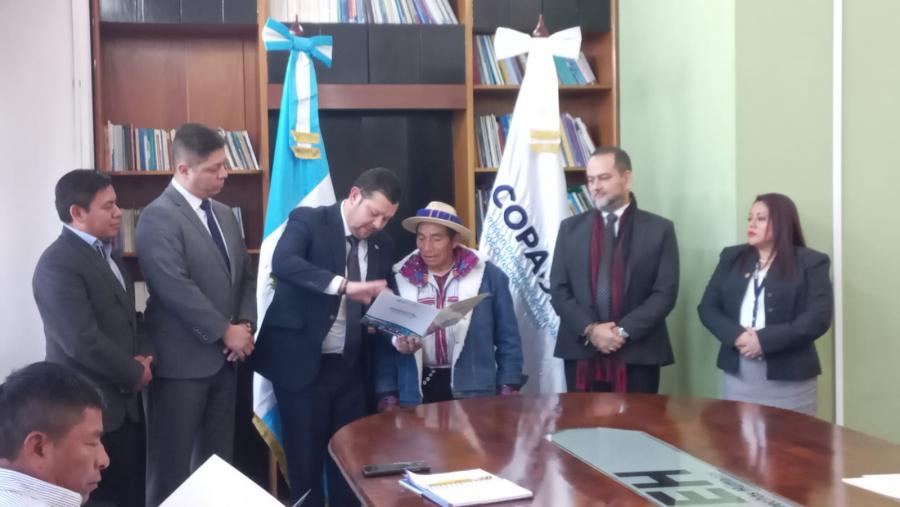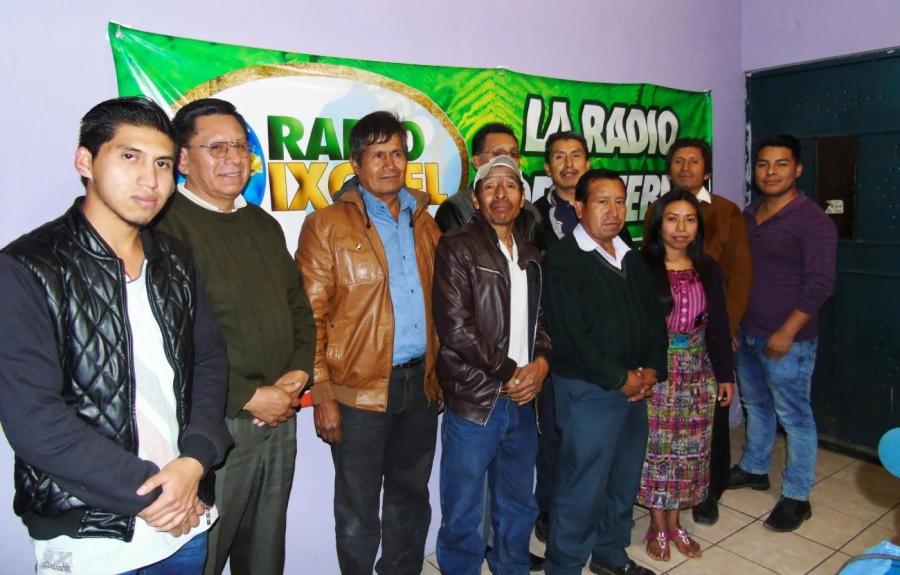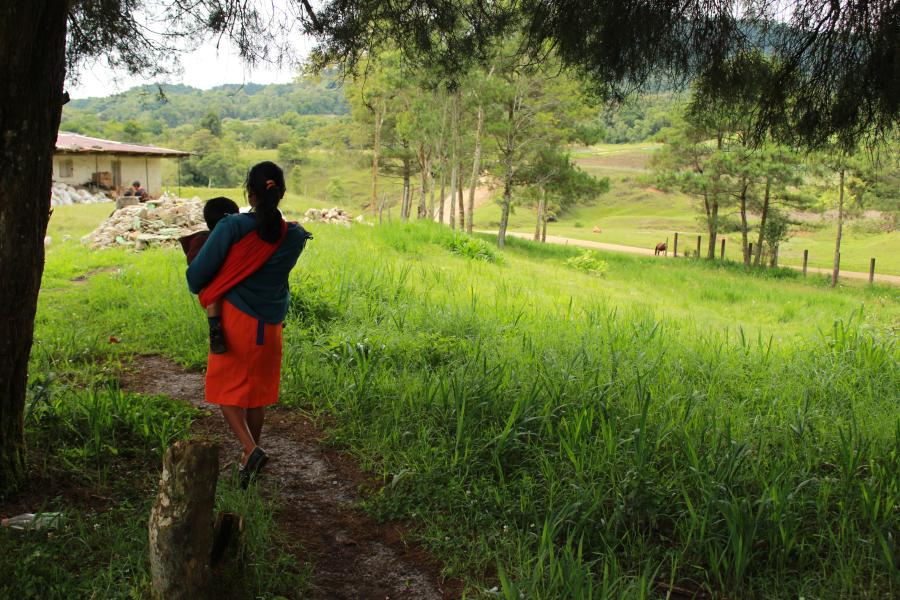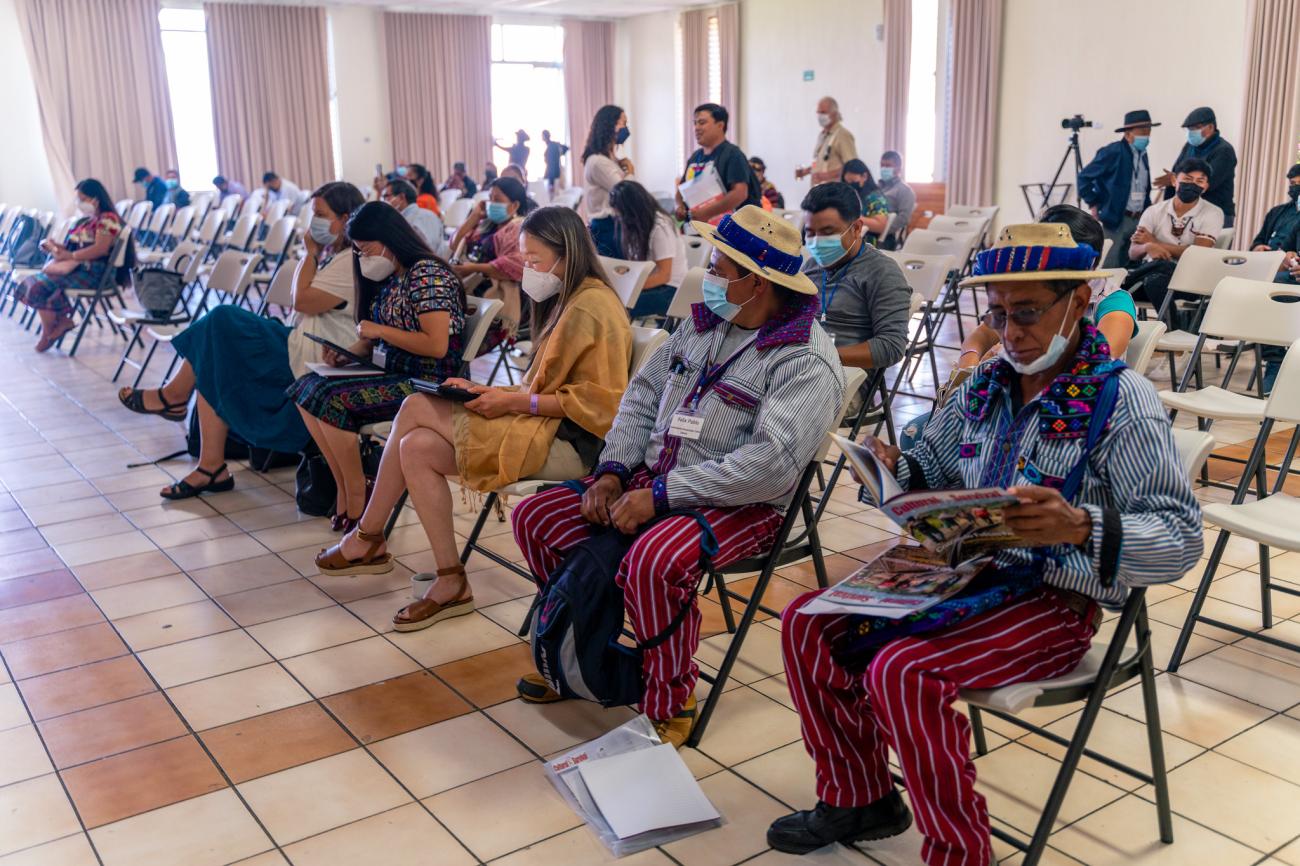
Officially, there are only two types of frequencies for radio broadcasting in Guatemala: radio frequencies for private stations and for public or State radio. There is no category for Indigenous community radio and no frequencies are assigned to them, despite the commitment in the 1996 Peace Accords to reform the law to ensure Indigenous Peoples’ access to radio frequencies and to be able to operate them.
Indigenous Peoples in other countries of Abya Yala, such as Mexico, Bolivia, and Ecuador, have made progress in recognizing Indigenous community communications within their legislation, and they have assigned radio frequencies to Indigenous Peoples. The goal of Maya, Garifuna, and Xinca Peoples in Guatemala, which represent more than half of the population, is to have their own media to share their reality, interests, and needs in their own languages as part of exercising their right of freedom of expression, which is the cornerstone of democracy and their right to identity.
Given the infringement of these commitments by the Guatemalan State, Indigenous communities, mainly Maya, organized and started their own community radio stations across the country to exercise their right to self-determination. In these cases, the community owns the station, which operates as a nonprofit in service of its people. This fight to democratize the radio spectrum has been going on for over 23 years. To date, no changes have been made to the telecommunications legislation.
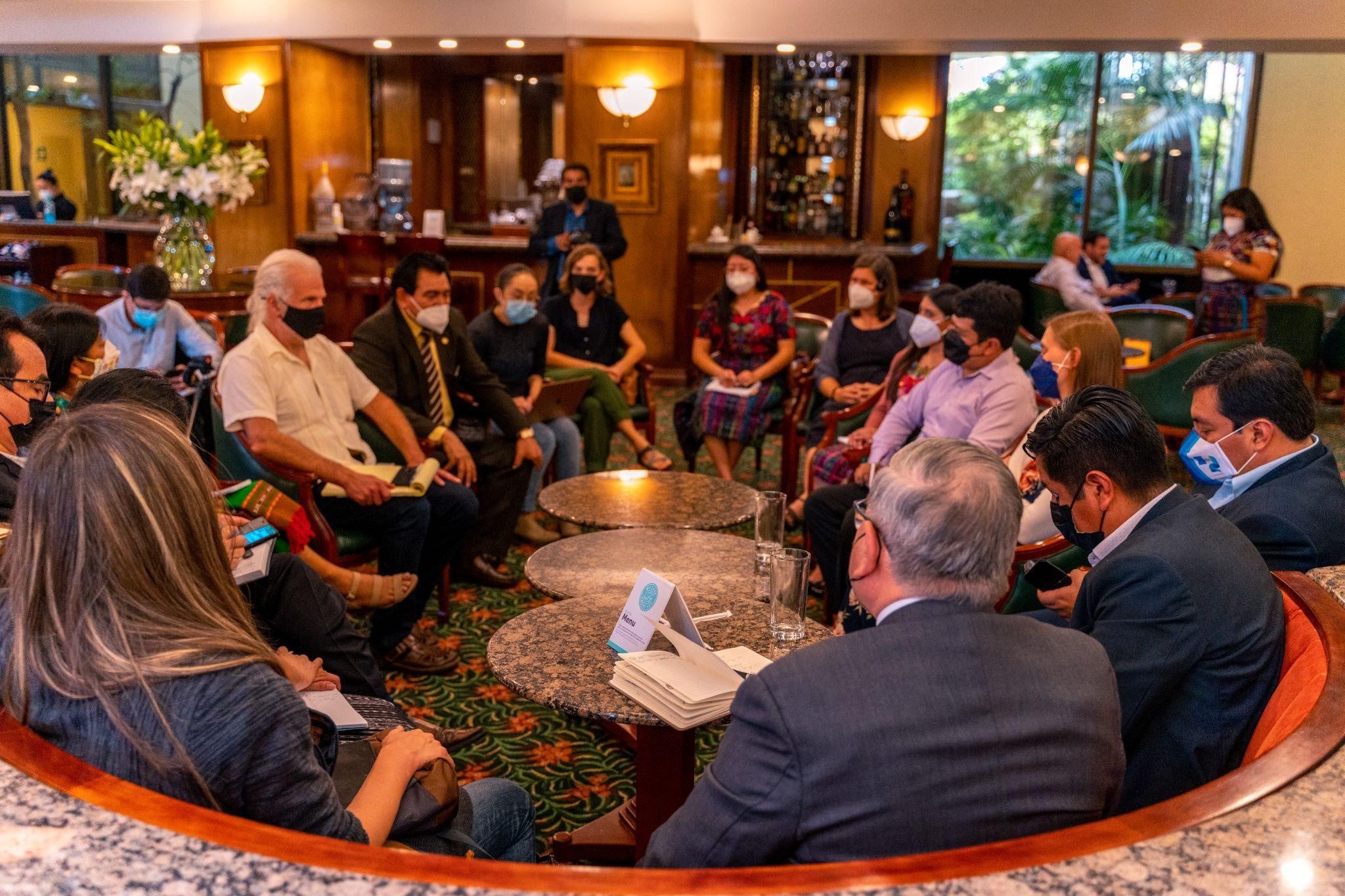
Members of Cultural Survival, Suffolk University Law Clinic, and Association of Maya Lawyers meeting with members of the Guatemalan Congress.
In 2012, members of the movement to legalize community radio filed charges against the State of Guatemala before the Inter-American Commission on Human Rights due to the lack of political will from the legislative body to legally recognize community radios. This case was granted admissibility eight years later and was transferred to the Inter-American Court of Human Rights. On December 17, 2021, the Inter-American Court publicly released its ruling that declared the State of Guatemala “internationally responsible for the violation of the rights to freedom of expression, the right to participate in cultural life, and equality before the law of Indigenous Peoples.” This ruling is based on the fact that the State has denied these communities access to radio stations through the radio spectrum. The decision orders the State of Guatemala to reform the Telecommunications Law, establishes reparations that the State must pay to four affected community radio stations, and also demands a stop to the criminalization of Indigenous communicators who work at these stations.
Cultural Survival has lobbied for change, provided technical support, and supported radio stations for many years. The historic court ruling was a moment of celebration for all parties involved in the process: community radio representatives, lawyers, and allied organizations. However, we knew that after the celebration, the process of implementation would be an uphill battle since Guatemala has 55 orders issued by the Inter-American Court, and most of them have not been complied with yet.
With a team of six international and national lawyers, specialists, and a technical team from Cultural Survival, we took the first step towards the implementation of the Court’s decision by organizing a Q&A session with representatives from the communities and community radio stations on July 30-31, 2022 in Guatemala. More than 80 representatives from community radios and Indigenous authorities participated. We presented the details of the case and discussed the need to collaborate between authorities and radio stations. The event participants also included around 30 ancestral Indigenous authorities from Chuarrancho, Todos Santos, Chisec, Santa Catarina Ixtahuacan, Cofradía de Poaquil, and the Garifuna ancestral authority, and members of 28 Indigenous community radios, including the 4 plaintiffs in the case (Xob’il Yol Qman Txun, La X Musical, Ixchel, and Uqul Tinamit), as well as Radio La Reina, La Voz del Pueblo, Radio Jornalera, and Radio Yurumein, among others.

Q&A session with representatives from the communities and community radio stations on July 30-31, 2022 in Guatemala.
One of the most important parts of the Court’s decision is that it demands the State of Guatemala to reform the law so Indigenous community radio stations can be recognized. However, in order to do this, a consultation needs to be held with Indigenous Peoples to obtain their Free, Prior and Informed Consent. The decision also mandates that a part of the radio spectrum is reserved for community radio stations and that these frequencies must be easy to access and free of charge for Indigenous communities.
During the dialogue with Indigenous authorities, participants shared their experiences, remarking that the State has violated their collective rights by ignoring or rejecting any consultation that they and their communities have promoted to oppose and reject the installation of megaprojects. The State of Guatemala reiterates that the contents of the ILO Convention 169 are non-binding. Often, State institutions such as the Ministry of Energy and Mines, municipalities, and development councils collude with extractive companies and manipulate this consultation process to lean the scale in favor of the corporations.

Q&A session with representatives from the communities and community radio stations on July 30-31, 2022 in Guatemala.
The most common practices in these bad faith consultations are bribing and manipulating Indigenous pseudo leaders, who are appointed by the government, rather than the community, to fulfill the government’s aims; promoting division among communities to get people to support the companies that are aligned with the government; violating, criminalizing, and incarcerating human rights defenders and members of Indigenous Peoples’ organizations; and using the police and the army to conduct these violations. Among the most recent cases are the criminalization of Maria Choc, Abelino Chub Caal, and Bernardo Caal Xol from the Q’eqchi’ Peoples.
Ancestral authorities also highlighted the fake consultation that was performed in El Estor, Izabal, and mentioned that in April 2022, they requested that the Constitutional Court reverse it because no proper consultation was conducted with the affected communities as instructed by ILO Convention 169. As a party to ILO Convention 169, the State has the obligation to perform consultations to obtain the Free, Prior and Informed Consent from Indigenous Peoples, and to do it according to their own community protocols.
Indigenous community radio has the support from authorities, midwives’ councils, Indigenous municipalities, community houses, calendar keepers, and healers who are the legitimate representatives of their communities. Community radio stations do not have political affiliations and their work is done ad honorem. Also, they are clear and firm on their own protocols, which is why the State has to take into consideration many different consultation mechanisms and does not necessarily mean that it will lead the State to adopt a specific law.

Members of Cultural Survival, Suffolk University Law Clinic, and Association of Maya Lawye visiting community radio stations.
The State of Guatemala has the obligation to recognize and respect ancestral and community authorities and Indigenous municipalities because they are the legitimate representatives of these Peoples. Their actions are based on national and international rules such as the Municipal Code Articles 18, 20, and 21; Article 66 of the Political Constitution of the Republic of Guatemala; Article 102, 14th transitory article of the Law of the National Registry of People; Article 8 sections 2 and 12 of ILO Convention 169 of Indigenous and Tribal Peoples in independent countries; as well as Article 5 of the United Nations Declaration on the Rights of Indigenous Peoples.
What Indigenous authorities and representatives of community radios would like in regards to consultation is to have a process where State authorities and the communities, who claim their self-determination as Indigenous Peoples, know how to implement their right to Free, Prior and Informed Consent in topics related to Indigenous community radio stations. One of the main results of these two days of dialogues was the clearly articulated support of Indigenous authorities to Indigenous community radio stations to promote the implementation of the Court’s decision.
Cultural Survival values and honors the trust that the radio stations and authorities put in participating in these events and for trusting in future work to implement the court decision. Cultural Survival, along with the Maya lawyers and the lawyers from Suffolk University who have been leading the case for almost a decade, visited the four plaintiff stations: Radio Ixchel in Sumpango-Sacatepequez; La X Musical in Cajola-Quetzaltenango; Xob’il Yol Qman Txun in Todos Santos-Huehuetenango; and Uqul Tinamit in San Miguel Chicaj-Baja Verapaz. The legal team also had the opportunity to meet with several allied organizations, as well as congresspeople who support the implementation of the court order, and staff from the Presidential Commission for Peace and Human Rights, which is the institution in charge of securing the implementation of the decision and responsible in coordinating actions along with ministries and other public entities related to the case.
As of October 2022, nine months have passed since the Inter-American Court on Human Rights issued its ruling, and the progress of the State of Guatemala in implementing the ruling has been poor. The lack of political will is evident; the State was required to issue a summary of the ruling in an official national newspaper and in a newspaper with the highest circulation in the country, in both Spanish and in Mayan languages of the four radio stations involved in the case by June 17, 2022. The deadline passed with no action.
For Indigenous Peoples, the refusal of the State to comply with its obligations is just another example of its exclusionary and discriminatory policies that will be hard to change, even after the historic ruling from an international court. However, Indigenous leaders are determined to keep pressing for their right to freedom of expression, their right to participate in cultural life, and their equality before the law. To make the implementation of the court ruling a reality, work will be done by the radio stations strengthened by Indigenous authorities.
Read Report: SECURING INDIGENOUS PEOPLES’ RIGHTS TO FREEDOM OF EXPRESSION AND FREE, PRIOR AND INFORMED CONSENT IN GUATEMALA.
